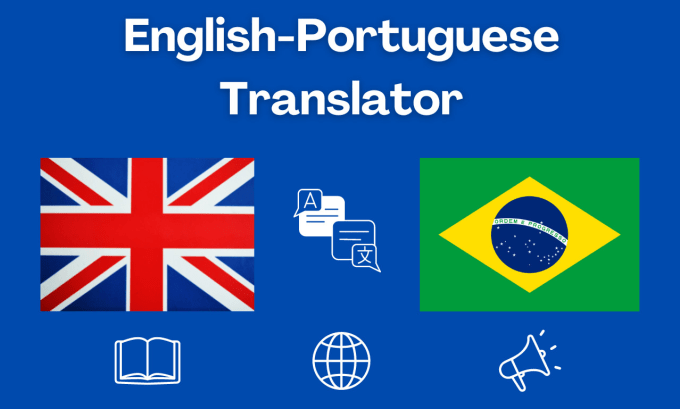Save Time with Quick and Exact English To Portuguese Translation
Save Time with Quick and Exact English To Portuguese Translation
Blog Article
Leading Tips for Perfect English to Portuguese Translation Provider
Accomplishing phenomenal English to Portuguese translation needs greater than plain word-for-word conversion; it requires an understanding of etymological ins and outs and cultural subtleties. Selecting qualified translators who are both culturally aware and fluent is critical. Equally essential is the method of localization, which involves customizing content to local variants. In addition, using contextual referrals ensures that the initial tone and significance are maintained. The trip doesn't finish there; an extensive review and editing procedure is crucial. What other critical aspects should be thought about to raise translation high quality further?
Understand Cultural Nuances
When translating from English to Portuguese, comprehending the cultural subtleties is essential for creating a resonant and exact text. The Portuguese-speaking world is varied, including various regions, each with its distinctive custom-mades, expressions, and social norms. A translator needs to be in harmony with these subtleties to make certain that the translation not only shares the intended message yet also reverberates with the target audience.
As an example, colloquial expressions in English may not have straight equivalents in Portuguese. An expression that works well in one society might bring about complication or misinterpretation in one more. Understanding regional dialects and variants, such as those located in Brazil and Portugal, is crucial; words may hold different undertones or usages depending upon the locale.
Furthermore, social context plays a considerable role in translation. Consideration of historical, social, and political variables can affect language options and tone. This cultural understanding enables for the adjustment of web content that aligns with local values and expectations, thereby enhancing the performance of communication. Inevitably, a thorough understanding of cultural nuances is important for providing translations that are not just linguistically precise yet additionally culturally pertinent and appealing.
Choose Certified Translators
Selecting qualified translators is a crucial action in making certain the precision and high quality of English to Portuguese translations. A translator's competence not just includes language proficiency but likewise a deep understanding of social context, colloquial expressions, and industry-specific terminology. When selecting a translator, prioritize those with official training in translation studies or grammars, as well as appropriate accreditations that demonstrate their expert skills.
Experience plays a pivotal duty also; translators focusing on certain fields-- such as lawful, clinical, or technological-- are more probable to supply precise translations tailored to the market's standards (English To Portuguese Translation). Additionally, consider their portfolio and client testimonials to analyze their previous job high quality and dependability
Engage translators that are indigenous Portuguese speakers, as they have an innate understanding of the language's subtleties and regional dialects. This knowledge boosts the translation's authenticity and effectiveness.
Use Contextual References

When equating, it is necessary to acknowledge colloquial expressions and social referrals that may not have direct equivalents in Portuguese. Particular phrases that reverberate in English may need adaptation to communicate the same psychological weight or social relevance in Portuguese. Using contextual recommendations can help translators select the best terminology and design, therefore enhancing the general clarity and impact of the translation.

Concentrate On Localization
Localization plays an essential role in the translation procedure from English to Portuguese, as it makes certain that the equated material is pertinent and culturally suitable to the target audience. English To Portuguese Translation. This process surpasses plain translation; it involves adjusting the content to the social, social, and linguistic click to find out more subtleties particular to Portuguese-speaking regions
Recognizing neighborhood idioms, personalizeds, and choices is important. As an example, particular expressions or references that resonate with an English-speaking audience might not have the same effect on Portuguese audio speakers. It is necessary to consider local variations, such as Brazilian Portuguese versus European Portuguese, as each has unique vocabulary and stylistic differences.
In addition, localization includes formatting, such as date and time layouts, money, and measurement systems, which can differ significantly across cultures. This focus to information promotes a connection with the audience, boosting involvement and comprehension.
In addition, utilizing neighborhood dialects and jargon can provide authenticity, making the web content much more relatable. By focusing on localization in English to Portuguese translation, services can efficiently interact their message, build count on with their audience, and ultimately accomplish their desired goals.
Testimonial and Edit Completely
Detailed evaluation and editing and enhancing are essential steps in the translation process, particularly when converting English content into from this source Portuguese. This stage ensures that the converted material not only maintains the original significance yet additionally reverberates well with the target audience. Given the social and etymological nuances, a meticulous method to examine and editing and enhancing is necessary.
Begin by comparing the original English text with the Portuguese translation, paying very close attention to context, tone, and terms. It's critical to ensure that social references and colloquial expressions are appropriately adapted for the Portuguese target market. Involving a second translator or a native speaker for this testimonial process can offer indispensable understandings and catch errors that may have been forgotten.
Additionally, look for grammatic precision and stylistic consistency throughout the record. Usual difficulties such as uncertain expressions or incorrect cognates need to be dealt with to stay clear of misinterpretation.
Final Thought
Attaining phenomenal English to Portuguese translation solutions requires a detailed strategy that encompasses understanding social nuances, picking qualified translators, using contextual referrals, prioritizing localization, and performing complete testimonials and edits. Each aspect plays a crucial function in making sure that translations are not only accurate however also resonate with the target audience. By implementing these techniques, organizations can improve the effectiveness of their interaction and foster a much deeper link with Portuguese-speaking audiences.
Achieving outstanding English to Portuguese translation requires even more than plain word-for-word conversion; it demands an understanding of cultural nuances and linguistic details.Picking certified translators is an essential action in guaranteeing the accuracy and top quality of English to Portuguese translations.Complete evaluation and editing are essential actions in the translation procedure, particularly when converting English content into Portuguese.Begin by comparing the initial English message with the Portuguese translation, paying close attention to terminology, context, and tone.Achieving exceptional English to Portuguese translation solutions demands a thorough technique that encompasses understanding social subtleties, selecting qualified translators, utilizing contextual referrals, focusing on localization, and carrying out thorough reviews and edits.
Report this page